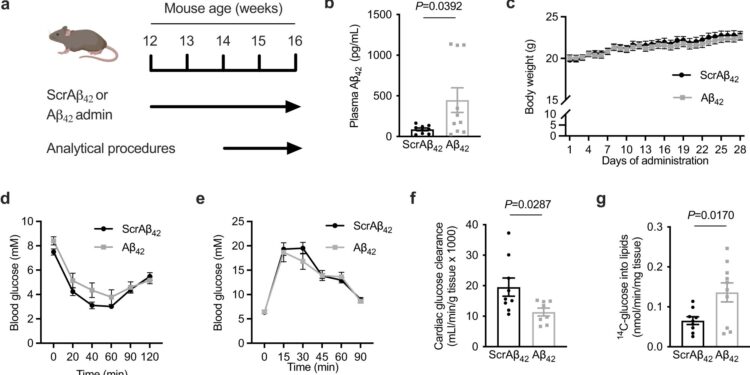Aβ42 administration reprograms cardiac metabolism. A schematic of an experiment where mice received Aβ42 or scrambled Aβ42 (ScrAβ42; 1 μg/day ip) for 4 weeks and analytical procedures were performed during the last two weeks. b Αβ plasma42 in mice 5 h after ScrAβ administration42 or Aβ42. vs body weight in mice given ScrAβ42 or Aβ42. d blood glucose during an insulin tolerance test in mice administered ScrAβ42 or Aβ42. eblood glucose during a glucose tolerance test in mice administered ScrAβ42 or Aβ42. F cardiac glucose clearance in mice administered ScrAβ42 or Aβ42. g 14Incorporation of C-glucose into lipids in mice administered ScrAβ42 or Aβ42. Credit: Natural communications (2024). DOI: 10.1038/s41467-023-44520-4
Obesity-induced heart disease, which affects up to 10% of the population in certain age groups, is considered an incurable disease and 75% of people do not survive more than five years after diagnosis.
But researchers at Deakin University have discovered a link between obesity and beta-amyloid, a protein previously implicated in the development of Alzheimer’s disease. The results of the study were published in Natural communications.
Professor Sean McGee, professor of medical biology at Deakin Medical School and the Institute for Mental and Physical Health and Clinical Translation (IMPACT), said a protein called beta-amyloid accumulates in the brain, causing the deposition of brain plaques that contribute to development. of Alzheimer’s disease.
“In this world-first study, laboratory tests revealed that beta-amyloid is secreted from fatty tissues into the bloodstream,” McGee said.
“We looked at both lean mice and mice fed a high-fat diet that led to obesity, and it was clear that the obese mice had much higher levels of beta-amyloid in their blood.
“This made us wonder if beta-amyloid was a causative factor in heart disease. So we treated normal lean mice with beta-amyloid, then monitored their metabolism and heart function, and found that This induced heart disease, just like obesity. We observed that beta-amyloid built up in the heart’s mitochondria (the power plants of the cell that generate energy) and prevented the production of energy in heart cells. Because the heart uses so much energy to pump blood, it is enough to cause heart disease.
“To our knowledge, this is the first time that beta-amyloid has been implicated in a disease other than Alzheimer’s disease. Until now, the negative effects of beta-amyloid were thought to be limited to the brain. “
The results of this study are the first to describe the production and release of beta-amyloid from adipose tissue as a cause of heart disease. The discovery goes beyond explaining the causes and has identified a possible approach to treating obesity-related heart failure.
“As beta-amyloid is linked to Alzheimer’s disease, many therapies and drugs have been developed in recent years,” McGee said.
“Many of these therapies were very effective at blocking the effects of beta-amyloid and were safe in humans, but most failed to effectively treat Alzheimer’s disease for a variety of reasons. So we treated obese mice with one of these developmental Alzheimer’s drugs and confirmed that it indeed prevented the progression of heart disease.
“This tells us that these amyloid beta-blocker drugs that were developed for Alzheimer’s disease could be immediately repurposed for obesity-induced heart disease.
“Since these therapies already exist and have been tested for safety in humans, it would be possible to move directly to clinical trials in patients with heart disease. This would reduce the drug development process by about 10 years .”
McGee is now seeking both grants and/or commercial support to advance this work.
“Obesity-induced heart disease is now considered an incurable disease, but this study sheds light on how it develops and provides a viable path for its treatment, and we are working to give new hope to patients with this very difficult disease.”
More information:
Liam G. Hall et al, Beta-amyloid 42 alters cardiac metabolism and impairs cardiac function in obese male mice, Natural communications (2024). DOI: 10.1038/s41467-023-44520-4
Provided by Deakin University
Quote: Research reveals new hope for obesity-induced heart disease (January 16, 2024) retrieved January 16, 2024 from
This document is subject to copyright. Except for fair use for private study or research purposes, no part may be reproduced without written permission. The content is provided for information only.



